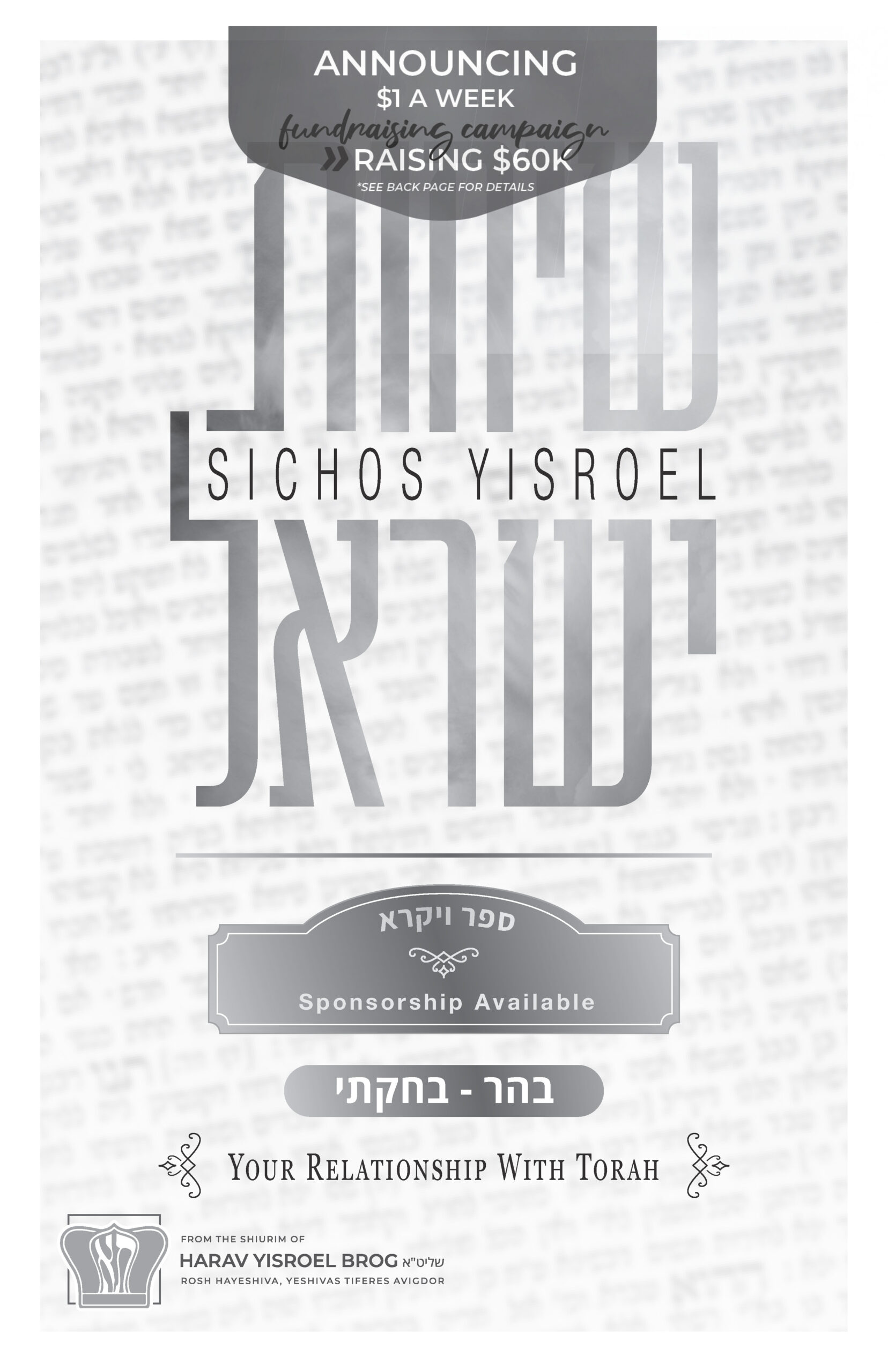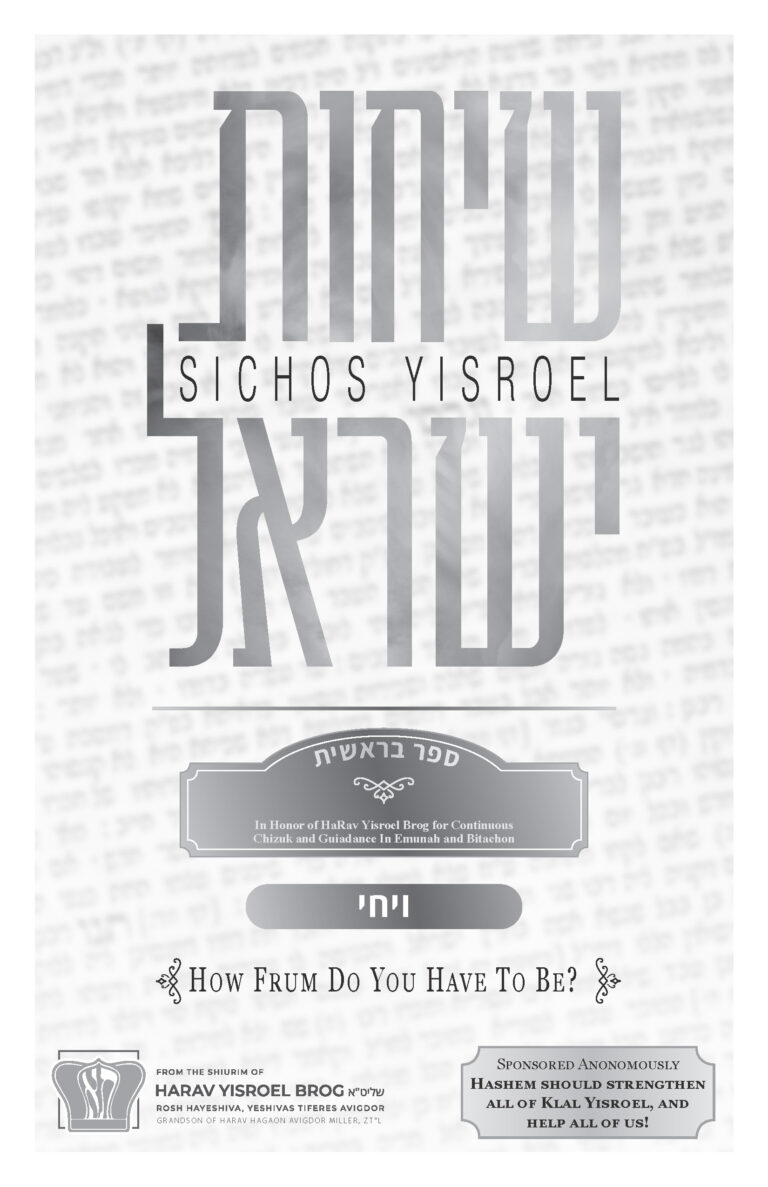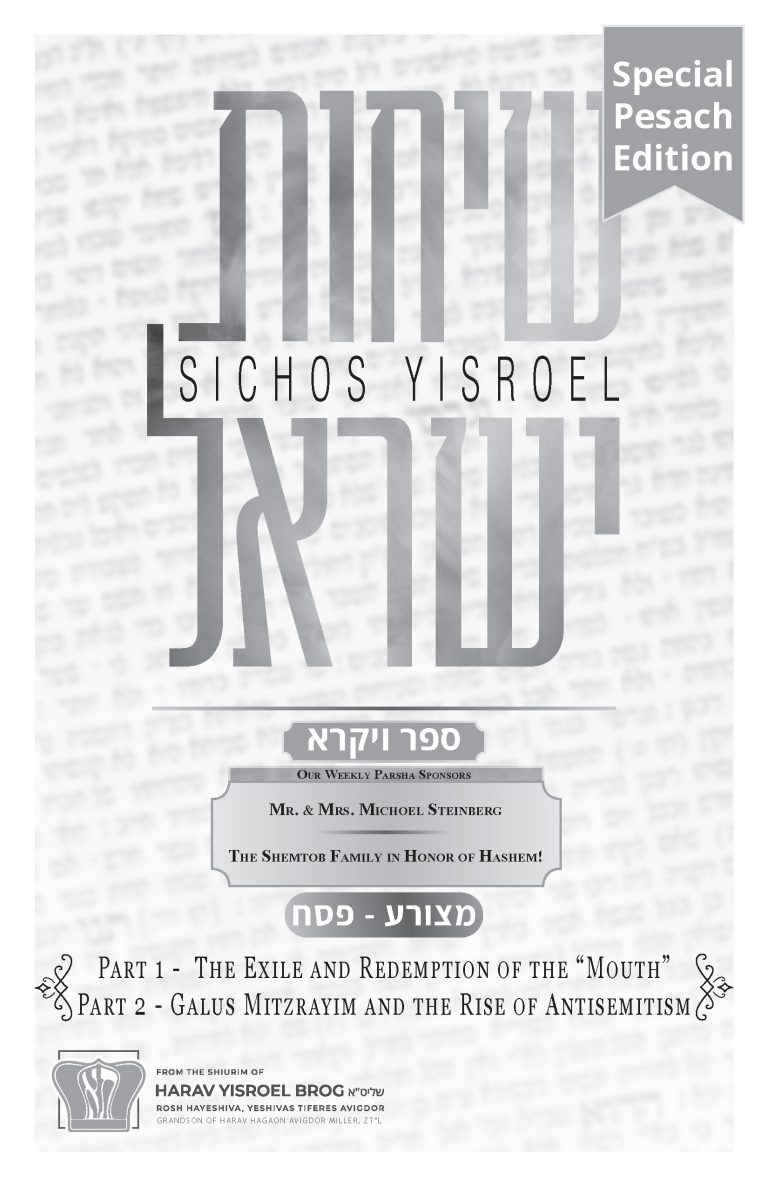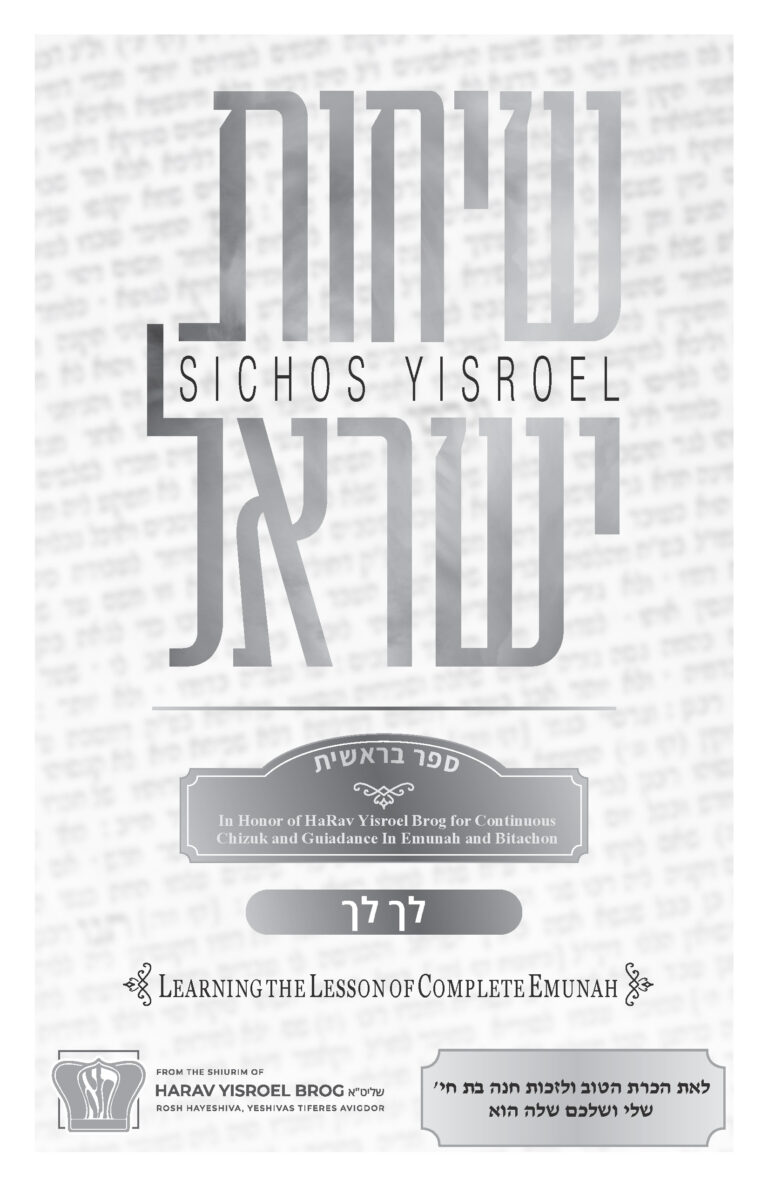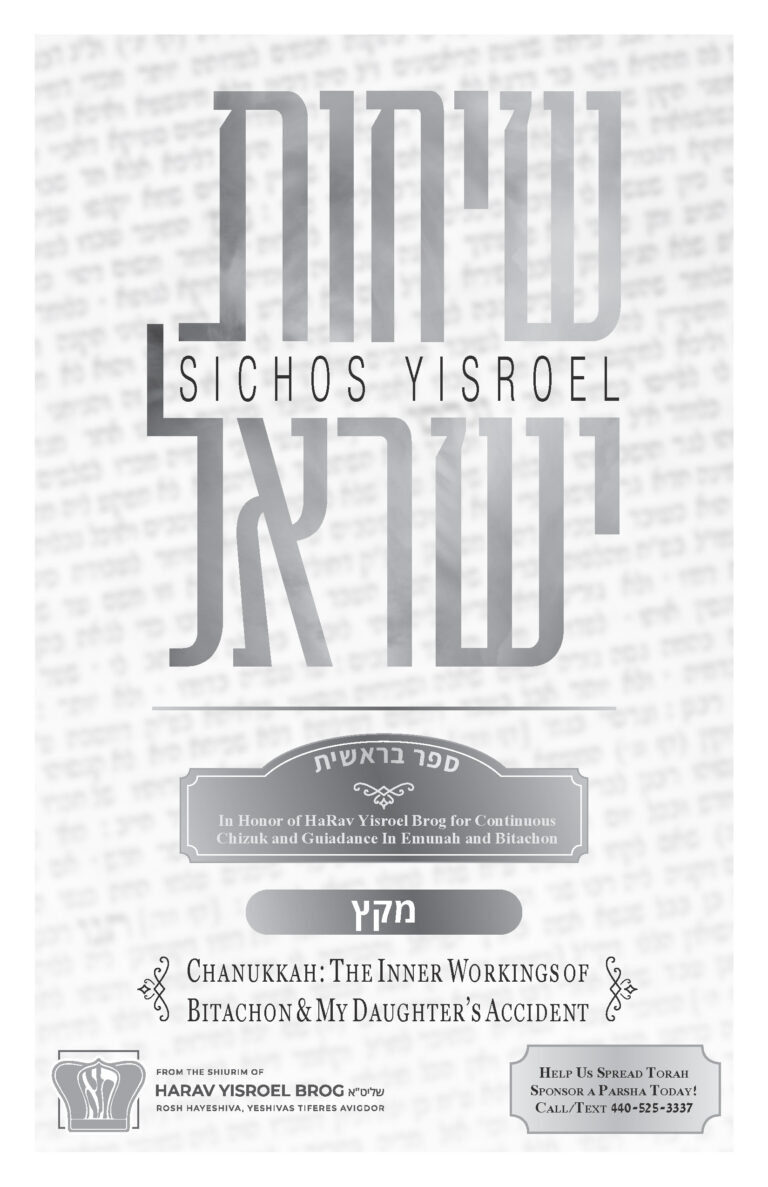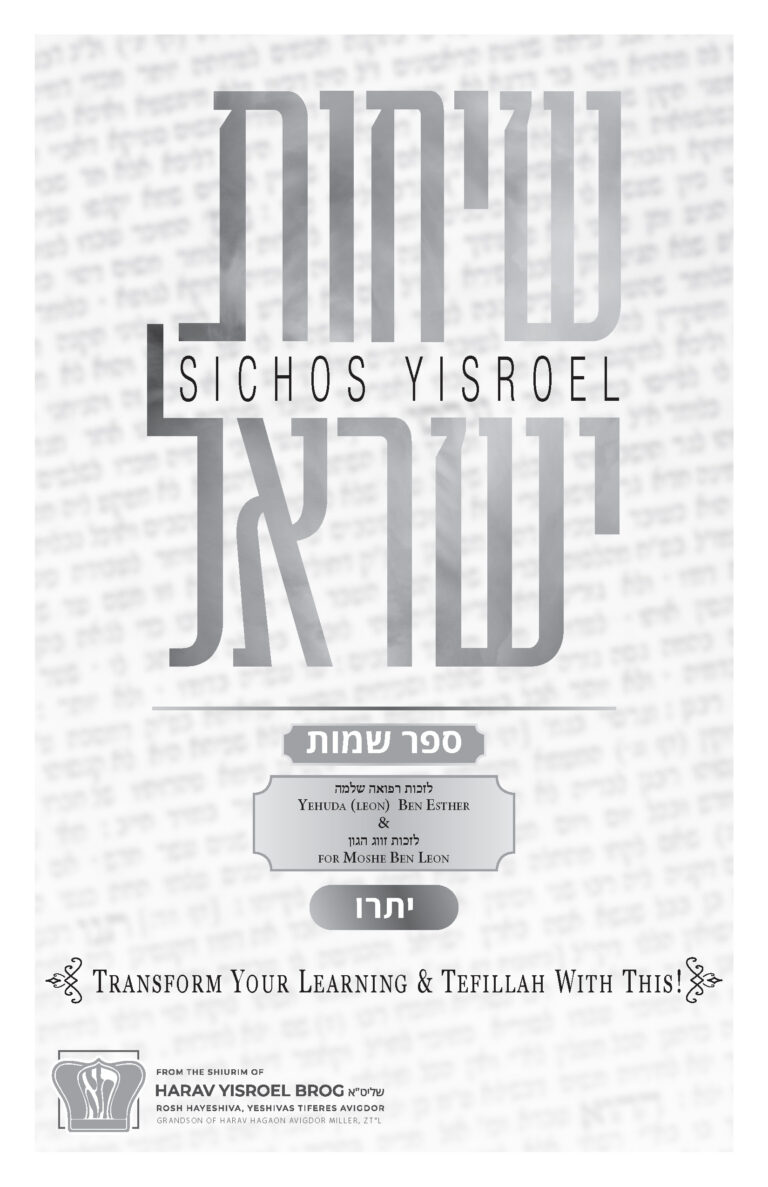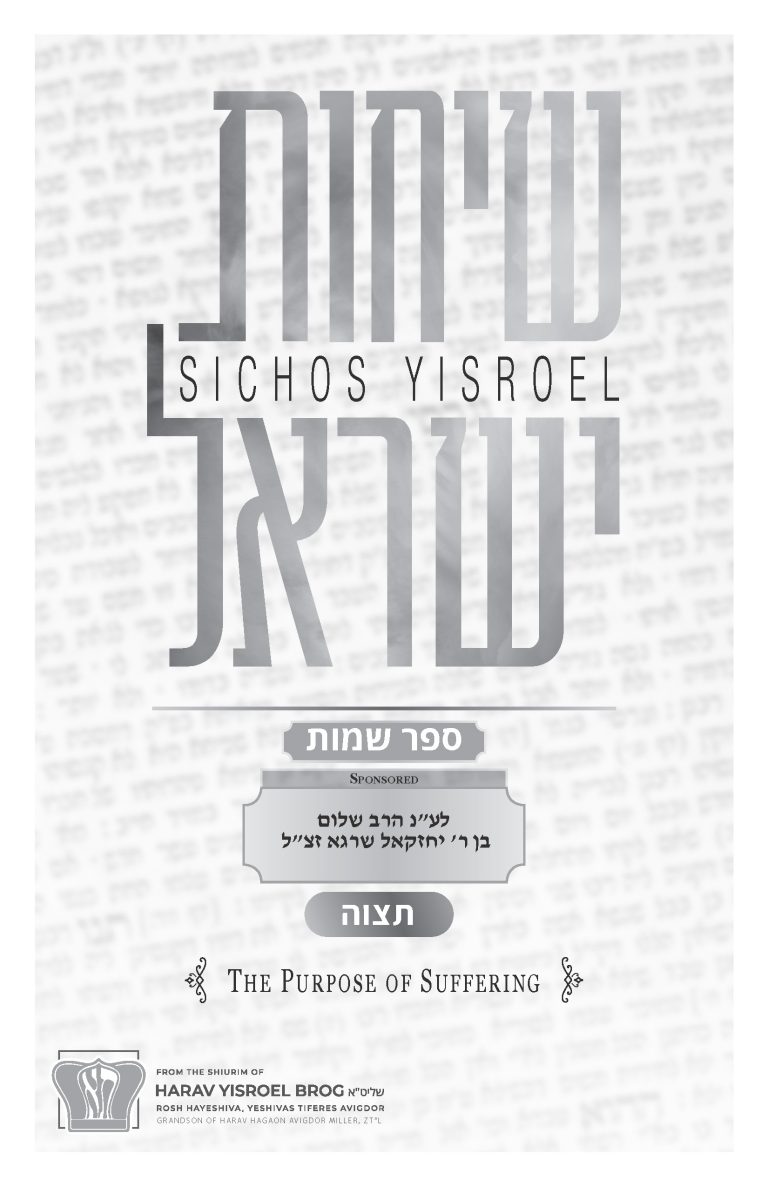Behar/Bechukosai 5783: Your Relationship With Torah
Sponsored
לעילוי יצחק מאיר בן לב בלוי
Consider sponsoring a shiur
Visit YTATorah.org
Shiur presented in 5779
It’s Not About Tochachah, It’s About Ameilus
Parshas Bechukosai falls out almost every year right before Shavuos, or close to Shavuos. The subject of Parshas Bechukosai, as many people will tell you, is klalos and brachos, or tochachah. But the emes is that tochachah is only the end result. Many of us deal with symptoms but we don’t think about the reason for the symptoms. You always have to search for the reason for the symptoms.
The subject of this parshah, actually, is one’s relationship with the Torah. Relationships are part and parcel of being a human being. There is relationship between children, there is relationship between parents, there is relationship between a husband and a wife, there is a relationship between a rebbi and a talmid, a relationship between friends, a relationship between the Ribono Shel Olam and Klal Yisrael, and there is a relationship specifically with the Torah and a Jewish person.
The passuk in Mishlei (8:17) says: אֲנִי אֹהֲבַי אֵהָב – “those who love Me, I love.” What does “I love those who love me” mean? Rashi says that Hakadosh Baruch Hu is saying, “I love those who love the Torah.”[i] Other mefarshim explain it to mean that the Torah is saying the Torah loves those who love it.[ii] If somebody loves the Torah then the Torah loves them.[iii] All the brachos that a person can experience in his life are as a result of his relationship with the Torah. All the klalos that a person has, are as a result of his lack of relationship with the Torah.
In the beginning of the parshah (Vayikra 26:3) the Torah says, if you’re going to אִם בְּחֻקֹּתַי תֵּלֵכוּ, “if you’re going to follow My statutes,” you’re going to be zocheh to all the brachos. And then it says (ibid. 26:14), “if you’re not going to listen to the Torah,” וְאִם לֹא תִשְׁמְעוּ לִי, then the klalos will come. Rashi explains, what does וְאִם לֹא תִשְׁמְעוּ לִי mean? It means, if you won’t be amal baTorah: לא תהיו עמלים בתורה – you are going to be willing to toil in Torah.
It’s very interesting. All the brachos come as a result of ameilus baTorah. אִם בְּחֻקֹּתַי תֵּלֵכוּ – “if you follow My statutes” and you’re going to be shomer the mitzvos and do My ratzon, you’re going to be zocheh to all the brachos.
Ameilus BaTorah And Yegiah BaTorah
Now, a cursory reading of the first passuk tells us, if you do everything that you’re supposed to do, you’re going to be zocheh to brachos. But Rashi says that אִם־בְּחֻקֹּתַי תֵּלֵכוּ can’t refer to mitzvos because it says in the second part, וְאֶת מִצְוֺתַי תִּשְׁמְרוּ, “and you observe my mitzvos.” So kiyum mitzvos, fulfillment of mitzvos, is already covered. So, how do I explain, אִם בְּחֻקֹּתַי תֵּלֵכוּ? It comes to teach you שתהיו עמלים בתורה, that you should be an amal baTorah.
Now we have to understand what exactly is unique about ameilus baTorah. First, you have to know that there are two things we are talking about here. There is something called yegiah baTorah and there is something called ameilus baTorah and they are two separate things. Yegiah baTorah means if somebody commits to learn under different challenges. For example, a guy has a headache and he goes to learn. That is yegiah baTorah. If a person has to travel to go learn Torah, that is called yegiah baTorah. But that is not called ameilus baTorah. Ameilus baTorah is when you are sitting in front of a sefer and you are amal, you are toiling to understand not the pashut pshat. You are toiling to understand the underlying reasons, principles and vos shteit doh, what is being said.
There is one person who reads, let’s say, a gemara and has a hard time figuring out how to understandthe words, where a sentence starts, where it ends, what the words mean. He takes a help sefer and uses that to help himself to get past that. That may be called yegiah baTorah, if he has to struggle. But that is not called ameilus baTorah. Ameilus baTorah begins, said the Brisker Rav, once a person knows the simple pshat; Rava says this, Abaya says this. That is pashut pshat. Now starts ameilus, to understand what the underlying reasons of Rava and Abaya are, what is the point of conflict, what are they arguing over. That is considered ameilus baTorah.
As my rebbi pointed out, seemingly, even after it says you should be ameil baTorah, the question still begs to be asked: Isn’t that included in the kiyum hamitzvos? When it says וְאֶת מִצְוֺתַי תִּשְׁמְרוּ, “you should observe My mitzvos,” isn’t talmud Torah one of the 613 mitzvos? So just as Chazal say that bechukoisai can’t refer to mitzvos because mitzvos are already referenced in וְאֶת מִצְוֺתַי תִּשְׁמְרוּ, how can ameilus baTorah be referenced in bechukoisai? This should be also included in kiyum hamitzvos.
Isn’t that a good question? I remember when I heard it from my rebbi. So my rebbi said: al korchach (we must say), there are two dinim. There is a mitzvah of limud hatorah and certainly that is included. But then there is a mitzvah of ameilus baTorah. You can fulfill the mitzvah of learning Torah without ameilus, but there is a maaleh of learning Torah with ameilus. It’s in a category all by itself and the sechar for that is especially great. And that is a very unique type of learning.
Now, the Chazon Ish tells us that all of the segulos that Chazal tell us that you merit when you learn Torah, are for ameilus baTorah, not for regular limud haTorah.
Why Run to Honor a Talmid Chacham?
Now, we have to understand, what is it about ameilus that is so special? So there was a tremendous tzaddik and gaon by the name of R’ Yosef Zundel MiSalant (1786-1866). He was the rebbi of R’ Yisrael Salanter (1810-1883). He was a giant, one of the top talmidim of R’ Chaim Volozhiner (1749-1821). And he writes – we have very few writings from him besides for some letters – but he writes a very interesting thing. He has a question.
The gemara in Berachos (7b) says: גדולה שמושה של תורה יותר מלימודה, serving a talmid chacham who is learning Torah and teaching Torah is greater than learning Torah from him. (If you have a choice to serve R’ Chaim Kanievsky or another gadol baTorah, or to learn Torah from them, what is better? The gemara says, גדולה שמושה של תורה יותר מלימודה. Now he says, lichorah,this is difficult to understand because the whole kavod of a talmid chacham is his Torah. Why are we mechabed a talmid chacham? Because he learns Torah. So how could it be that if you “serve” the talmid chacham, that is greater than the learning of the Torah itself?
So R’ Yosef Zundel says, the idea is like this. Because the greatest thing that Hashem wants from us is the toil. And he explains why. כי ע”י העמל, if you see a person toiling in Torah, what can you tell about that Torah? If you see a person who is toiling in Torah, what does that tell you about that person? What is nikar, what is recognizable about that person, as opposed to a person who is not toiling in Torah? He says, it is ניכר וגלוי, it is distinguishable and it is revealed, אהבתו ותשקתו של האדם לחכמה, person’s love and desire for wisdom. A person needs to have an ahavah for Torah to toil in Torah. He has to have an ahavah for chochmah. So when a person is mafkir himself to be meshamesh and serve his rebbi in order to be mekabel from him chochmah and da’as, he shows his ahavah and his teshukah for the divrei Elokim chayim yisborach. That is a person who is certainly going to be willing to toil a lot to understand the Torah. And that is the ikar that Hashem demands from us.
So the ikar idea of ameilus and yegiah is that it expresses a tremendous ahavah and a desire for Torah. That is the nekudah. And because of his great ahavah, he’s willing to commit and be meimis himself, to give himself up, to sacrifice himself for Torah. But without ahavah and without chibah, a person does not want to exert himself.
There is No Laziness Where There is Love
Many people are lazy. Everybody has a little bit of laziness, some people have more, some people have less. But you know what you notice? All lazy people become very great zerizim when they become faced with doing something they love to do. They never get tired. I never see lazy people have a difficult time playing sports because they love the sports. I never see them get tired playing with phones, or technology, and they want to know everything possible to do with that technology because they have great love for it. Similarly, if you have a love for something you’ll be willing to invest in them.
A person has to know that the mitzvah of ameilus baTorah is a mitzvah of loving the Torah. All the brachos that a person gets is for loving the Torah, loving chochmah. A person who uses his seichel that is attached to his neshamah, and immerses that into understanding chochmah, that person is working on his love for Torah. You know what we see many times? A person learns something and he doesn’t grasp it right away, so he tries a second time if he’s a tzaddik. After the second time, if he doesn’t get it, what does a guy do then? Let this one go. That’s what he says. Why does he say that? Because he has no ahavah for it. He has no ahavah for the chochmah.
Why R’ Meir Simcha Davened for Ahavas HaTorah
There is a famous story with R’ Meir Simcha of Dvinsk (1843-1926), the Ohr Sameach. The story was sourced from the rosh yeshivah in Detroit, an alter Mirrer named R’ Leib Bakst (1915-2003). R’ Leib Bakst related a story that he had a relative who learned for a number of months, every year, be’chavrusa with R’ Meir Simcha. One time, when they were learning, they had difficulty understanding a particular Tosafos. They were struggling with it. Now, if R’ Meir Simcha was struggling with it it must have been seriously hard – he was a man who knew kol haTorah kulah. So he said, “Nu, what are we going to do?” They couldn’t call anyone on the phone. They couldn’t check it online. They didn’t have an English or Yiddish translation/elucidation. So what did they do? He said, “Let’s stop the learning and let us ask from the One who is in charge of this chochmah. We’ll ask Hashem. כִּי ה’ יִתֵּן חָכְמָה מִפִּיו דַּעַת וּתְבוּנָה.” So R’ Meir Simcha told his chavrusa, we are going to daven now to be zocheh. We want to ask Hashem, not to understand the Tosafos, but we want to ask Hashem to be zocheh to ahavas haTorah. That is what we should daven for.” Do you hear that?
At the conclusion of their tefilah, they opened the gemara again and went back to learning and they were zocheh now that the windows of chochmah were opened up for them and the Tosafos became clear. So at the end of the learning, the chavrusa turned to R’ Meir Simcha and he asked, “R’ Meir Simcha, why did you instruct me to daven for ahavas haTorah, davka? Why didn’t you tell me to daven for havanas haTorah, to understand the Torah?”
You know what he answered, R’ Meir Simcha of Dvinsk, the heilige R’ Meir Simcha? He said: “Let me give you a mashal. There was a mother who gave her child over to a babysitter, a neighbor, and said, ‘Watch my child for a short time until I come back.’ Meanwhile, the kid began to cry. So the neighbor checks the kid out and he doesn’t understand why the baby is crying. And he doesn’t know how to quiet the baby down. Until the mother comes home. The mother comes back and in one second she hears her kid crying. She walks over to the kid and understands what he wants and she calms him down. What is the pshat? The mother has ruach hakodesh? How does the mother know what was bothering her child?”
He said, “Because if a person gets a wound in his hand or a wound in his foot, does only his hand bother him, or does only his foot bother him, or does his whole body bother him? All the eivarim, limbs in a person bother him. Do you know why? Because they are all one. They are all attached to each other. A mother loves a child so much, that she is like one guf, one entity with her child. So when the child is in pain, the mother understands exactly what the pain is.”
R’ Meir Simcha explained further: “I said we should daven for ahavas haTorah because havanas haTorah, understanding Hashem’s Torah depends on the degree of your love for Torah. Somebody who loves the Torah is attached to the Torah, and becomes one with the Torah, like it says ישראל ואורייתא חד הוא, Klal Yisrael and the Torah are one, so mimeilah the person understands the Torah also, just like the mother understands the child. Therefore, I said that we should daven to be zocheh to ahavas haTorah because if we’ll have ahavas haTorah, we’ll be zocheh to understand the Torah itself.” There is no greater brachah, there is no greater nachas ruach that a person could give Hashem than loving the Torah!
Women Can Also Have Ameilus BaTorah
And that’s why I’ll tell you an amazing thing. Many people think that it’s only for men. It’s not true. Women also have this great opportunity. The gemara (Berachos 17a) says, “How is a woman zocheh to Torah?”[iv] She doesn’t learn Tosafos. You know what it says? She serves the people who learn the Torah. She serves her husband, she serves her children. If a mother loved the Torah, when she sent her kids off to yeshivah in the morning, she would be full of excitement because her child is going to learn Torah, she would wish him to be zocheh to ahavas haTorah. She would transmit her love for the Torah to her child. But many women think, “This is not my field.” They have no love for the Torah. And if their husband would come home one minute after they decide they have to go sleep, they would not be happy. I have spoken to many yungerleit. I said, “When you come home, do you spend a few minutes with your wife?” They answer, “Are you kidding? My wife needs her beauty sleep. By 9:30, she’s out.”
The gemara says that in order for a lady to be zocheh to Torah, she has to demonstrate her ahavas haTorah. It is interesting. The gemara says that they wait for their husbands to come home. Very interesting. So when the husband comes home, he doesn’t feel like he was out bowling with his friends and his wife is not a bowler so she went to sleep and he went to bowl. You have to demonstrate the connection. Have you ever read about these gedolei olam? Have you read stories about R’ Elyashiv’s rebbetzin? R’ Elyashiv used to get up at 2 or 3 o’clock in the morning. His rebbetzin always woke up with him regardless of when she went to sleep. And what did she do? She prepared a coffee for him. Do you think R’ Elyashiv couldn’t prepare himself a coffee? He could learn the whole Shas, whole Shulchan Aruch, kol haTorah kulah. You think he couldn’t make himself a coffee? I can picture most wives telling their husbands, “You know, if my sleep gets disturbed in the middle of the night, I’m finished for the night. My whole night is gone and my whole beauty sleep is shot and now my whole day is shot and then my whole week is shot. You want me to be a good wife? I can’t do that.” So what do they say to their husbands? You want to get up and learn? That’s fine. Just make sure you don’t make noise and you make your own coffee. When they come to the next world, they are going to say, “I let my husband learn at 2 o’clock in the morning. Do I get any sechar for that?” No. Because where was your ahavas haTorah demonstrated?
Hashem is going to say to you, “I didn’t demand of you to wake up. Why didn’t you wantto get up to give your husband his needs?” What did R’ Elyashiv’s rebbetzin do after she gave him what he needed? She went back to sleep. If a mother wakes up for a baby in the middle of the night, what does she do? She goes back to sleep. If a person loves something, a person is willing and feels an honor and a kavod to be meshamesh them. There are many mothers, with all their rules of sleep, still, when their baby wakes up at night, they don’t let the baby cry. They want to wake up and be there for their baby because they feel, it’s like one guf, one zach. Nu, when it is one zach, you can’t ignore it. Half of me is crying, I can’t sleep.
A person has to know, this is a new insight into what it means to toil in Torah. Everybody has to love the Torah. And if you want brachos, you have to demonstrate your love for Torah. Men have to demonstrate it. Women have to demonstrate it. And that’s what it says over here in the passuk, אֲנִי אֹהֲבַי אֵהָב. Hashem says, “I love those who love my Torah.” Now, loving Torah, is loving Hashem. Appreciating Torah, is appreciating Hashem. No question about it. But it’s not going to come without development. You have to develop a love for Torah.
Parents Transmit to Their Kids What They Love
Let’s say a mother has a love of cauliflower. She tries her hardest to transmit that love of cauliflower to her children, so they should know how healthy it is, how wonderful it is, how good it is and how tasty it is. When a mother has a love for bangs, so they give their kid their first chalakah and they want to keep the bangs all the way down to the eyes, they want to show, “Oh, he looks so cute, so cute.” And the kid thinks, “So my mother loves this.” This is what the mother loves. So he always wants to keep his bangs. And what does it help him? He gets ‘banged,’ that’s all. Gornisht.
Parents transmit to their kids their love. And a father has to come home from learning and he has to feel that love for Torah and show the love.
The Sweetest Dance from Learning The Rashba
I remember hearing from my wife something that mamash moved me to no end. My shver, rosh yeshivah, hagaon hatzaddik, R’ Refael Baruch Sorotzkin (1917-1979) was very leibedig in his learning, and from time to time he would come home after a second seder and he would take his rebbetzin, Rochel, the daughter of the Telzer Rav (R’ Avraham Yitzhak Bloch, 1891-1941), and he would say to her, “Come Rochel, let’s dance.” Let’s dance. Why? “I had such hana’a (pleasure) from the Rashba today, I want to share it with you.” The kids couldn’t join in. The kids had to watch. He used to take her on a little waltz, “Ah mir tantzen oif de simchah fon de Rashba – we are dancing from the simchah that comes from learning the Rashba.” After I heard that, every time I think about that, it gives me goosebumps – the hairs rise in the nape of my neck. You know what amazing chinuch that is when a child sees that? “What are you tantzing about?” “Oh, it’s our anniversary, oh I’m loved, I’m cared for.” Shtuyot! That’s nonsense. But waltzing over a Rashba, a simchah in Tosafos, because we understood a pshat in a Tosafos today?! You know what that is? That is unbelievable!
I know there are many people who dance with their wives. You know when? When they get a new car. Or the husband tells his wife, “I’m taking you on a vacation, honey. We’re going on a vacation.” “Wow! Are we going to a hotel for Pesach?! Oh boy!!” Let’s do a jig over there, you understand? That’s what turns them on. But to dance over Tosafos? To come home after learning a shverer gemara, and say “I got the pshat. I toiled on it.” That only comes from ahavah.
If you Love the Torah, The Torah Will Love You
A person has to know, you must develop a relationship of ahavah with the Torah. And if you love the Torah, the Torah will love you. That is what is unique. The Torah is called a Toras Chaim, a Torah that is living, so it really means, the Torah will love you. And if the Torah loves you, you are going to be in great shape!
And your kids will love to learn. How many parents sit and wonder, “Why does my kid hate to learn? How come my kid can’t stand learning Torah?” Is it because of how much you showed him you loved Torah. Did you show him your love for Torah or did you show him you love health food or how much you love seven-layer cake from a special bakery? What love did you impart to your child? And if you impart your love for the Torah to your child, your child is going to want to love to learn Torah. But if your child saw when the mother got her smartphone she was so tickled pink, she was so excited about it. She looked in the chumash and said, “What does a king have to do? A king has to carry his Torah wherever he goes. Ah, if that is how a king has to love Torah, that is how I’m going to love my smartphone.” And then she has to figure out how she will carry her smartphone because she only has two hands, she doesn’t have three hands. They don’t make these holsters for women, they make holsters for men for the phone. You don’t see women wearing belts around their waist holding their phone, so they carry their phone. Talmudo beyadoi, you see. They are always carrying it in their hands. They walk around the house taking care of the kids, they keep the phone near them and there’s a little ping. Ping. Poo! Everybody runs over to the thing. Mir loifen (we are running), mamash running to the thing. That’s ahavah. Nebach. But that’s sick, let me tell you!
And your kid sees that. So then your kid says, “You want me to run to learn? Ma, I learn from you, hee hee. The only thing that tickles me is technology. Technology really moves me, just like that moves you. I saw you spent days figuring out how to work your phone.” She spent nights. It was real “ameilus.” What you love is what you toil in, and what you don’t love, you don’t toil in.
It’s Erev Shavuos now, Rabbosai. The Torah tells us all the brachos are from the Torah. If you love the Torah, the brachos will come to you. If you don’t love the Torah you’re jeopardizing all the brachos that Hashem wants to bring to us.
The Bottom Line
The main subject of parshas Bechukosai is our relationship with the Torah. All the brochos in our sedrah come our way only when we toil in Torah, not simply learn it. This applies equally to men and women, based on our own unique roles and responsibilities. The famous dictum of Mishley, אֲנִי אֹהֲבַי אֵהָב, “If you love Torah, then Hashem or the Torah/chochmah will love you in return,” has to be understood in the context of what R’ Yosef Zundel of Salant famously said, that the strong desire and love for chochmah is the main prerequisite for toiling in Torah. This is why a shimush of talmid chacham is greater than learning from him, since the desire to serve him demonstrates a person’s thirst for drawing from and connecting to the talmid chacham’s wisdom, and ultimately to that of Divrei Elokim Chayim. This passionate drive to chochmah is the ikar of what Hashem wants from us regarding our relationship to Torah. And while we may not yet be on the level of spontaneously breaking into a joyous dance upon getting clarity in our learning – like R’ Refoel Boruch Sorotzkin did, or davening for ahavas haTorah (vs. its understanding) – like R’ Meir Simcha of Dvinsk did, we can still appreciate how important it is to strive for chochmah. And if we ponder and internalize these lessons and stories deeply enough, we ourselves can begin to ask and plead for chochmah, so that when Hashem hears our sincere tefillos, He will testify regarding us, אֲנִי אֹהֲבַי אֵהָב. And in that zechus, the upcoming Yom Tov of Shavuos will be truly transformational for us, our spouses, our children and all those around us.
[i] אהבי. אהביה כתיב אמר הקב”ה אני אהביה של תורה אהב זו שמעתי מרבי אהרן בשם רבי נתן
[ii] אני אהבי אהב. מי שכבר דבק בחכמה לאהבה אותה, תאהב החכמה גם אותו ותגלה לו סודותיה כאשר יגלה האוהב סודותיו לאהובו, ותצרהו מכל חטא כמ”ש אהבה ותצרה, כאשר ישמור האוהב את אוהבו (מלבי”ם)
[iii] משא”כ אהבת התורה היא משתלמת בכ”מ ובכ”ז וכמאמר החכמה בפי שלמה ברוה”ק אני אוהבי אהב ומשחרי ימצאונני. הבטיחה שני דברים שהיא אוהבת אותו וגם נמצאת לפניו. וכדאי’ בסנהדרין דצ”א נפש עמל עמלה לו העמל בד”ת היא עומלת לו במק”א, היינו שמסייעת להבינהו ולהתמתק בלבו עד שנמשך אליה באהבה שלימה והיא רוחנית ועזה. נמצא דבזה”ז יקרה לפני ה’ אהבת התורה מאהבת ה’ באשר היא בשלימות יותר (העמק שאלה על שאילתות דרב אחאי גאון, קדמת העמק, קדמת השלישי ה׳:ט׳)
[iv] אֲמַר לֵיהּ רַב לְרַבִּי חִיָּיא: נָשִׁים בְּמַאי זָכְיָין? בְּאַקְרוֹיֵי בְּנַיְיהוּ לְבֵי כְנִישְׁתָּא, וּבְאַתְנוֹיֵי גַּבְרַיְיהוּ בֵּי רַבָּנַן, וְנָטְרִין לְגַבְרַיְיהוּ עַד דְּאָתוּ מִבֵּי רַבָּנַן (רש”י: לבי כנישתא – תינוקות של בית רבן היו רגילין להיות למדים לפני רבן בבית הכנסת; בי רבנן – בית המדרש ששם שונים משנה וגמרא; ונטרן לגברייהו – ממתינות לבעליהן ונותנות להם רשות ללכת וללמוד תורה בעיר אחרת)
